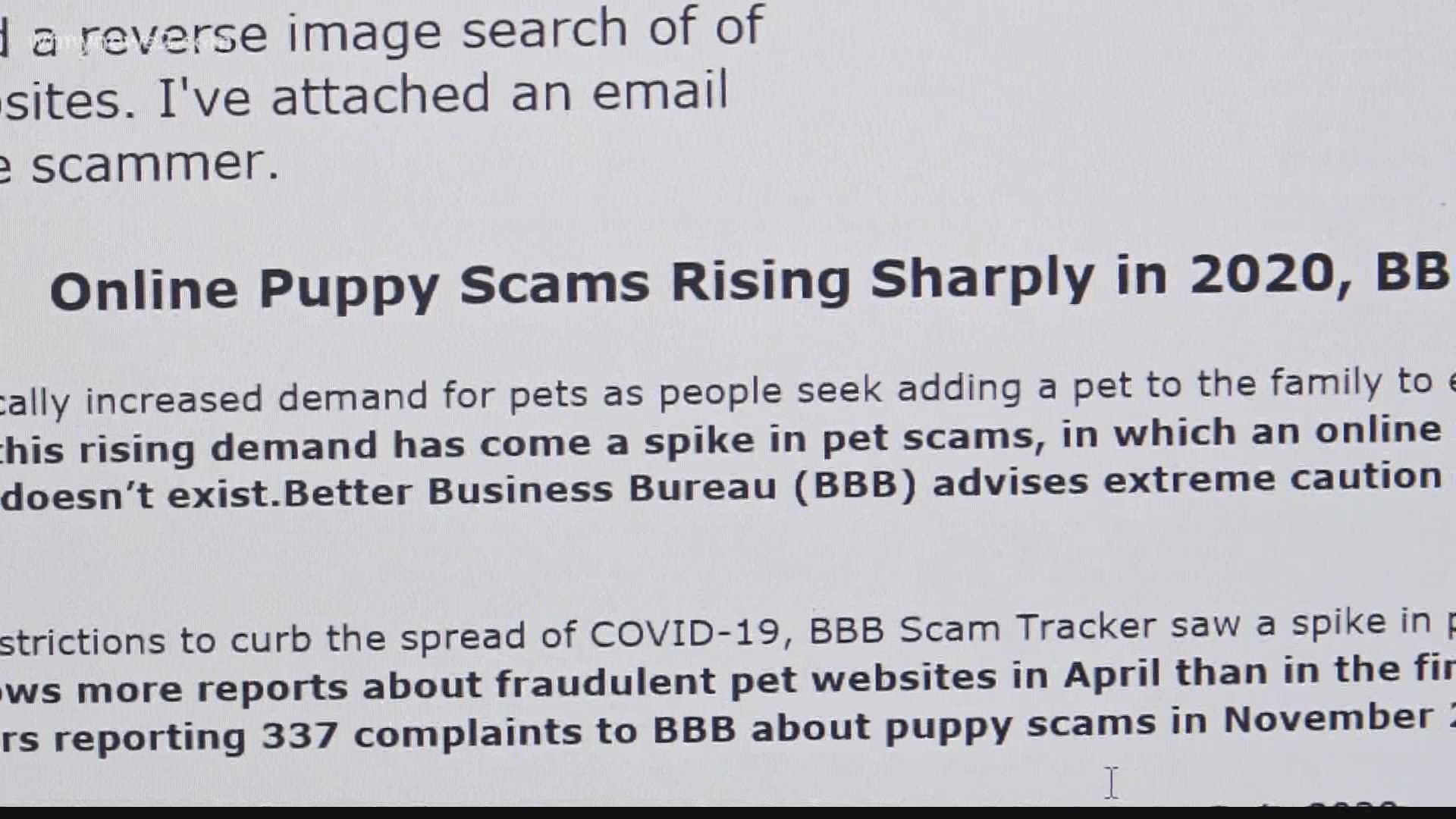HIGH POINT, N.C. — The Better Business Bureau is warning about online puppy scams. According to the consumer watchdog group, the COVID-19 pandemic has dramatically increased the demand for pets to ease the loneliness and tension. This rise in demand has also created a spike in online pet scams.
According to the BBB, unsuspecting would-be pet owners are paying hundreds of dollars or more to purchase a pet that doesn’t exist. The organization advises pet shoppers to exercise extreme caution when looking for a pet online, as scammers continue to evolve in their tactics.
The BBB said consumers filed 337 complaints about puppy scams in November 2020 alone which represents an increase from 77 during the same month in 2019.
In the Triad, there were just 8 reports in 2019, but there have been 15 so far in 2020.
The average loss reported to the BBB Scam Tracker in 2020 is $750 with people aged 35 to 55 accounting for half of the reports.
“COVID-19 has made for a long and uncertain year, and a ‘quarantine puppy’ or other pet has proven to be a comfort for many people, but it also has created fertile ground for fraudsters,” said Lechelle Yates, Director of Communications for BBB of Central and Northwest NC. “People currently shopping for pets online are prime targets for fraudsters trolling the internet looking for want-to-be pet owners. Knowing the red flags associated with this scam can help consumers avoid heartache and losing their money.”
Yates said the projected dollar loss from these scams is expected to top $3 million, more than six times the total losses reported in 2017.
Yates also said the scammers are changing their operations by using mobile payment apps like Zelle and CashApp and ditching Western Union or MoneyGram wire transfers. Both Zelle and CashApp have issued warnings about pet scams.
Last month, one High Point woman wanted to get a dachshund puppy as an emotional support dog and lost $250 in the process.
"They just had this amazing website about the training and the dogs and what to use and that they were going to come with a crate and a blanket," Erin McDonough said.
McDonough said she found a website for a business named "Nikis Dachshund Puppies" which advertised a cream-colored puppy named Bella which she fell in love with and renamed “Buttercup.”
The seller priced the puppy at $600, on sale from $1,200 for the holidays. There was also a $150 shipping and home delivery fee for a total price of $750. McDonough said she paid $500 through her mom’s Zelle account. When Zelle's restrictions kept her from sending the additional $250, the seller told her to buy a gift card for the rest. She said she did as instructed and sent photos of the front and back of the card to the seller.
"I finally made them call me and they didn't know what was really going on. I asked for a current picture, it was just the same one as the puppy had never grown. Then when they tried to get me to send $1,500 to get her shipped that's when someone I knew said that's a scam," McDonough said.
Luckily for McDonough, the Zelle account was linked to a Wells Fargo account so her mom called the bank. The payment was still “pending” and so the bank was able to refund $500, but the scammers got away with the $250 from the gift card.
“I believe in people being good. I had no idea anybody would do that,” McDonough said.
"They've found all kinds of ways to prey on us during this pandemic but this is probably the lowest. One person reported to us that they lost $9,500 on the pet scam," Yates said.
The BBB said puppy shoppers need to do their research and a simple reverse image search on Google.
"See if it pops up somewhere else. In this instance, we were able to find Bella on somebody else's website with three different names and they called it a male," she said.
BBB recommendations for buying pets online:
- See the pet in person before paying any money. In light of the COVID-19 pandemic, consider a video call with the seller so you can see the seller and the actual pet for sale. Since scammers are not likely to comply with the request, this may help avoid a scam.
- Do a reverse image search of the photo of the pet and search for a distinctive phrase in the description.
- Do research to get a sense of a fair price for the breed you are considering. Think twice if someone advertises a purebred dog for free or at a deeply discounted price … it could be a fraudulent offer.
- Check out a local animal shelter online for pets you can meet before adopting.
- BBB urges more law enforcement action against pet scammers.
- The media and public should help to educate those looking for pets online by sharing BBB’s tips and study.
Who to contact if you are the victim of a pet scam:
- Petscams.com - petscams.com/report-pet-scam-websites tracks complaints, catalogs puppy scammers, and endeavors to get fraudulent pet sales websites taken down.
- Federal Trade Commission (FTC) - reportfraud.ftc.gov to file a complaint online or call 877-FTC-Help.
- Better Business Bureau - BBB Scam Tracker to report a scam online.
- Canadian Antifraud Centre - antifraudcentre-centreantifraude or call 1-888-495-8501 for scams involving Canada.
- Your credit card issuer - if you provided your credit card number, even if the transaction was not completed.


